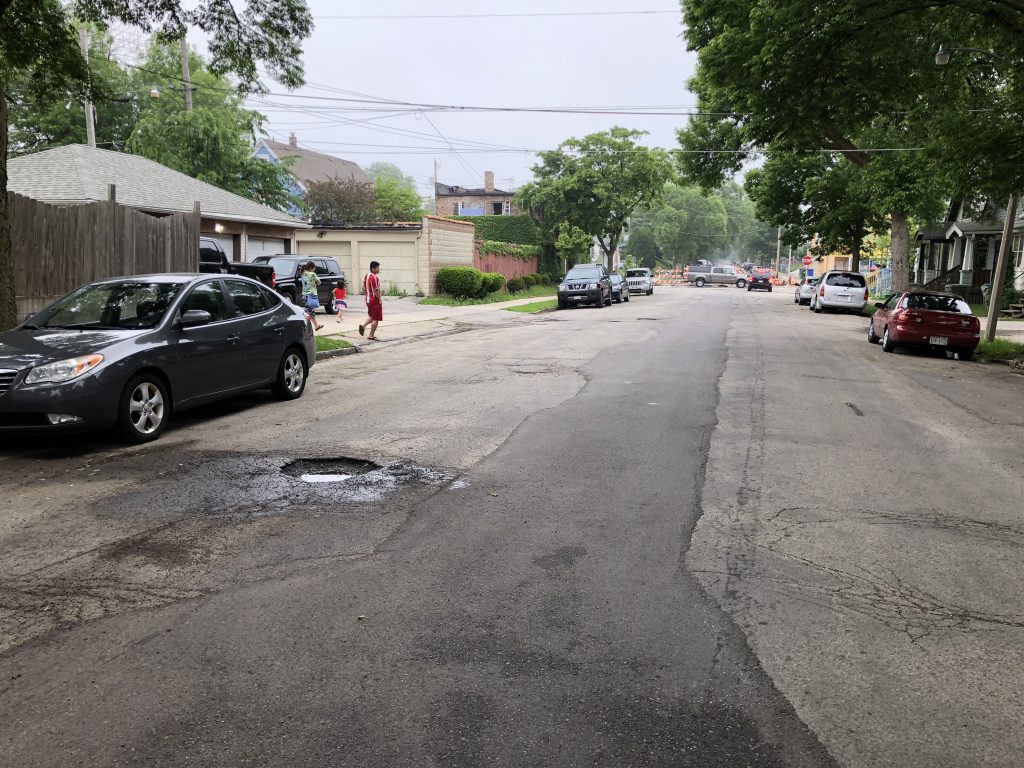Council Wants Better Pothole Response
Public Works officials say Milwaukee bests other cities. Not good enough, aldermen say.
The Common Council wants faster action on potholes, but the Department of Public Works says the city is already responding faster than other Midwestern cities.
City Engineer Samir Amin, testifying before the Public Works Committee said the department currently has a backlog of 1,000 known potholes and fills approximately 250 daily. Amin said 100 to 150 new potholes are reported every day in the spring, which results in a 3.2-day response time. “We are in good shape,” said Amin.
Amin said Chicago currently has a backlog of 16,000 potholes and a 20-day response time, while Indianapolis has a seven-day backlog and Pittsburgh has a four-day response time.
Beyond citizens reporting potholes and other issues, the city has five employees that spend much of their day on city streets reporting issues said DPW street operations manager Jerrel Kruschke.
But Bauman and others want more. Borrowing an idea from his recent idea on snow plowing, Bauman said: “why don’t we create a title under the name of ‘quality-of-life inspector.’ Retirees, they go for thirty hours a week.” These workers would specialize in reporting quality-of-life issues across the city.
“I have to jump in to say we have to be conscious of the budget,” said Ald. Michael Murphy. “I am very concerned about hiring more personnel to do just one thing.”
“It seems like there’s a lack of initiative,” said Ald. Mark Borkowski of the city’s efforts to identify quality of life issues. Borkowski, Bauman and others expressed frustration that illegal dumping and car crash debris often goes weeks or months without being picked up.
Help Is On The Way
The warm weather should help in addressing the potholes. The city will switch entirely to hot patch asphalt next week so filled potholes should last for months or years, not days.
Amin walked the committee through why DPW uses cold patch asphalt over the winter to fill potholes. It boils down to cost. Asphalt plants shut down over the winter because of freezing temperatures. And asphalt is much cheaper to use.
Better products than cold patch exist, including polymer-based asphalts, but they’re sold only in small quantities and are prohibitively expensive. Amin said the city currently pays $80 per ton for cold patch, while polymer-based solutions would cost between $800 to $1,500 a ton. “It wouldn’t work,” said Amin.
“We definitely get what we pay for,” said Ald. Russell W. Stamper, II. “We’re paying a lot of money for stuff that doesn’t work.” Stamper, who said the roads in his district are in a state of emergency, pushed the department to study the cost savings for the city in not having to refill the cold-patch fill that breaks down and the savings for residents in not having to repair their vehicles.
“It’s our dilemma every year,” said Amin of the need to use the cold patch and the large number of potholes caused by the freeze-thaw cycle at the end of winter. Amin pledged to continue to look for alternatives to cold patch.
Call Center Issues
The city’s unified call center, which fields service requests from everyone from police officers to citizens, has a reporting isuse to fix.
Currently, if a duplicate request is submitted, the subsequent requests are marked as closed with no additional information provided to the submitter. “We’re not intending to say it’s resolved when it’s not,” said Amin, who notes the original submission still gets addressed.
But that doesn’t sit well with Murphy, who is upset that the software issue has gone unresolved. The alderman said the city should treat its citizens as customers. “I think sometimes you guys are missing the big picture,” said Murphy. “You’re leaving an impression that we’re not doing our job.”
But Richard Watt, who oversees the call center in his role as Policy and Administrative Manager for the city’s IT Department, said this is the first he’s heard of the issue. Watt said his department had instructed DPW to simply leave the duplicates open until the issue is resolved.
“You see the frustration from the citizen,” asked Murphy. “Oh absolutely,” responded Watt.
“I just feel that the city has a laissez-faire position, ‘we’ll get to it when we get to it,'” said Ald. Khalif Rainey.
“Where is [Mayor Tom Barrett]?” asked Borkowski. “I’m putting the plea into the mayor because simply we’re not being listened to.”
Watt pledged to address the problem in the next week.
This isn’t the end of the discussion. The committee held the file to hear it at a future meeting. “Alright, well we have beaten this up pretty good,” said Bauman in closing the item after 45 minutes of debate.
If you think stories like this are important, become a member of Urban Milwaukee and help support real independent journalism. Plus you get some cool added benefits, all detailed here.
Political Contributions Tracker
Displaying political contributions between people mentioned in this story. Learn more.






















